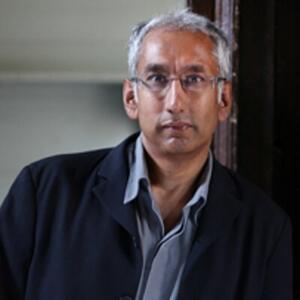Two conferences in two European cities. Two ban attempts (though only one successful). Two different reactions from politicians and the media. All of this tells us something about the state of free speech today.
Last Tuesday, Emir Kier, the mayor of Brussels, made international headlines when he tried to ban the National Conservative Conference in that city. The attempt failed, rejected as "unacceptable" by Belgian Prime Minister Alexandre de Croix, and declared illegal by the highest administrative court.

Five days earlier, with far less comment and condemnation, Berlin police had forcibly shut down a conference on Palestine. Ghassan Abu Sitah, chancellor of the University of Glasgow and a reconstructive surgeon, who was due to speak about his experiences in Gaza hospitals, was banned from entering Germany.
Former Greek finance minister Yanis Varoufakis, now general secretary of the left-wing movement DiEM25, was presented with betätigungsverbot, a ban on all political activity in Germany, including online participation from another country.
Speakers at the National Conference (NatKon) condemned the role of the "liberal elite" and the European Union in trying to silence them. It was actually the act of a rebel mayor who was kicked out of the Socialist Party because of his ties to Turkey's far-right politicians. In contrast, the conference in Berlin was extinguished by all the force of the state. However, no prime minister condemned the action, and few mainstream media criticized it.
The topic of free speech is usually considered a leftist topic: the left as supporters of censorship, and the right as "warriors for free speech". This, however, means taking conservative mythomania literally. To be sure, the left's historic commitment to free speech has weakened in recent years. However, the right's hostility to censorship has rarely been anything more than hypocrisy.
Nigel Farage, who was at the podium when the police raided the NatKon conference, gave an interview to the BBC. He was asked about Hungarian Prime Minister Viktor Orbán's censorship policies. His hostility to immigration, liberalism and the European Union has turned Orbán into a political hero in NatKon circles. What about Orbán's authoritarian policies that have undermined both academic and media freedom? Such policies, Faraž insisted, have nothing to do with censorship. Orbán actually wanted to “prevent global millionaire George Soros from indoctrinating children. That's different”.

If my ideological soulmate imposes censorship, it is to protect people. If my ideological enemy does the same, then it is an attack on freedom of speech.
Kiir used two justifications in his attempt to ban the NatKon conference: one is that the public needs to be "safe" and the other is that the conference is a gathering of the extreme right. Both the use of "security" as a justification for censorship, and the loose use of categorizations in order to target political opponents, have become the backbone of the contemporary "cancel culture". Although often pushed by the left, the right is just as adept (in many cases even more adept) at using them.
The wave of "anti-voucher" legislation that has swept through Republican states in America, including bans on "unacceptable" attitudes in universities and corporations, is often justified in a protectionist way.
If my ideological soulmate imposes censorship, it is to protect people. If my ideological enemy does the same, then it is an attack on freedom of speech
In many such states, professors are prohibited from introducing material that could cause "any feeling of discomfort, guilt, suffering, or any other form of psychological discomfort because of the race or sex of an individual." Earlier this month, an appeals court ruled that it was unconstitutional for Florida, through its "individual liberty law," known as the "anti-vouch" law, to ban "ideas labeled offensive." A Florida judge noted that the law "prohibits professors from expressing objectionable views ... while allowing unrestricted expression of opposing views." In their study of the culture of cancellation in American universities, "Cancelling the American Mind", Greg Lukianov and Ricky Schlott note that "ironically, the right and the left have reversed roles when it comes to imposing ... speech codes on universities."
The right, however, has always been prone to censorship. What has changed is the fact that the left has given conservatives a new weapon with which to carry out their censorship. The right has happily embraced the language of safety and insults in order to implement its ideological intentions while at the same time rejecting the use of the same by the left, characterizing it as "vouchism".
Take for example the current attempts to suppress pro-Palestinian speech. From university campuses to social media, academics, artists and writers have been fired or silenced for supporting Palestinian rights or criticizing Israel.
Describing a case in which students at Columbia University were asked to remove Palestinian flag emoticons during a Zoom meeting because they provoked "traumatic reactions", academic and writer Natasha Lenard noted that this could sound like "far-right parody material: an absurd example the 'wolf' of culture". However, "security" has become "the latest weapon... to silence criticism of Israel."
"People experience the feeling of discomfort with some information as if they are physically unsafe," remarked one student. This confusion has been made possible by many on the left who, as Lenard says, have undermined the distinction "between the feeling of security and real security."
And just as many on the left have stretched the meaning of "far right" to attack opponents, many on the right (as well as liberals) are stretching the meaning of anti-Semitism to target critics of Israel. The best example of this is Germany. One reason why the shutdown of the Berlin conference caused less outrage than the failed attempt to ban the Brussels conference is that censorship of Palestinian voices has become commonplace.
It is not just pro-Palestinian voices whose rights can be undermined in the name of protecting the public. A police officer recently told Gideon Falter, of the Campaign Against Anti-Semitism, that as an "openly Jewish" person he could not approach a pro-Palestinian march - even though most such marches include a visible Jewish bloc. The Metropolitan Police apologized but, in the initial statement, added that people like Falter must know that "their presence is provocative" and that it represents a threat to "public safety". The police then had to apologize for apologizing. It's hard to think of a more textbook example of anti-Semitism than telling a Jew he can't be visibly Jewish for fear of causing a riot.
We should oppose attempts to censor political speech and criticism under the guise of "public protection". We should also recognize that the left has provided the right with a weapon with which to attack progressive causes. It is always those who fight for social justice who suffer the most damage from the imposition of censorship.
The text is taken from "The Guardian"
Prepared by: NB
Bonus video:





